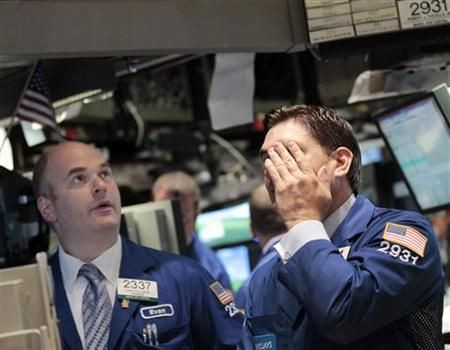Stocks Plunge in Mini-Meltdown on Econ Worries

The U.S. stock market had a mini-meltdown on Thursday ahead of Friday's all-important Bureau of Labor Statistics (BLS) jobs report and in the face of a worsening debt crisis in Europe.
The S&P 500 Index fell 60.27 points, or 4.78 percent, to close at 1,200.07. The Dow Jones Industrial Average plunged 512.76 points, or 4.13 percent, to end at 11,383.68. The NASADQ fell 5.08 percent.
The price of crude oil plunged more than 5 percent to settle at $86.63. While lower oil prices are generally good for the economy, a 5-percent fall in one day indicates the expectation of low global demand for oil (which signals global economic weakness).
Having breathed a brief sigh of relief over the U.S. debt deal to avoid default, investors are now focused squarely on the U.S. and global economy. On Thursday, the situation looks gloomy.
"The damage this week is more than last week - translation, more damage from economic fears than debt fears," said Howard Silverblatt, senior index strategist at S&P.
Yields on Italian sovereign bonds rose on worries of excessive debt and weak economic growth prospects. The Italian stock market also fell 5 percent.
If the European sovereign debt crisis spreads to Italy in full force, the results could prove disastrous and uncontainable because it is the third largest economy in the euro zone.
In the U.S., economic data has been downbeat across the board in recent weeks. On Friday at 8:30 a.m. ET, the U.S. government will release the Bureau of Labor Statistics (BLS) jobs report, arguably the weightiest economic data in the world.
In the days leading up to the BLS jobs report, jobs data (weekly initial jobless claims and monthly ADP private sector payrolls gain) actually edged above the bearish consensus forecast of economists.
However, investors are still cautious ahead of Friday's report, which will likely confirm that the U.S. economy created less than 100,000 jobs in July.
The U.S. economy needs at least 100,000 new jobs per month to keep pace with the expansion of the labor market. It needs a lot more than that to lower the unemployment rate and keep climbing out of the Great Recession.
Jobs gains were just 18,000 in June and 54,000 in May.
© Copyright IBTimes 2024. All rights reserved.





















